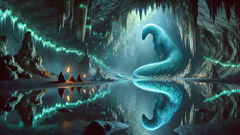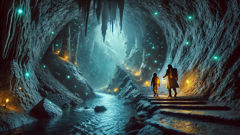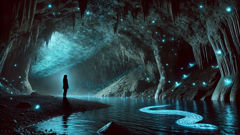Introduction
Deep beneath the emerald hills of New Zealand’s North Island, a hidden world shimmers in perpetual twilight. This world is neither wholly dark nor quite light—a realm sculpted by time, water, and the breath of the earth itself. Here, the Waitomo Caves wind their way beneath the surface, their limestone corridors echoing with the soft drip of water and the hush of ancient air. For centuries, the Maori people have revered these caves, their mysteries shrouded in tales passed down from generation to generation. Waitomo means 'water passing through a hole' in Te Reo Maori, but the name barely hints at the magic within: rivers vanish into the land, reappearing as subterranean streams guarded by beings older than memory. The Maori whisper that deep in these watery labyrinths, the Taniwha dwell—guardian spirits and sometimes fearsome monsters who protect the caves and all their secrets. Above the cool darkness, glowworms—tiny living lanterns—turn cave ceilings into starry night skies, weaving their own silent magic. To journey into the Waitomo Caves is to step into a story older than stone, a tapestry woven from myth and nature, light and shadow. In this legend, you will meet Hinewai, a brave Maori girl, her wise grandmother Kuia Aroha, and the unseen forces that shape their world. Their story unfolds as mist gathers at dawn, when courage is tested and the boundaries between worlds grow thin. The Waitomo Caves are more than an underground marvel—they are a living link to the ancient heart of Aotearoa, where every ripple and every flicker of light carries the echo of a legend.
Whispers in the Mist: The Call of the Waitomo
Hinewai was born to the song of the river. In her village, perched where forests gave way to rolling pastures, the Waitomo stream was more than a line of water winding through the land. It was a living thread tying the people to their ancestors and to the spirit world beneath their feet. Every morning, mist rose from the stream, curling between flax and ferns, and Hinewai would watch it from her window, wondering where it truly led. Her grandmother, Kuia Aroha, often sat beside her, spinning stories as old as the stones. Kuia’s voice was soft, yet every word carried the weight of countless dawns. She spoke of taniwha—creatures that dwelled in the deep places of the world. Some taniwha were fierce, others gentle, but all were guardians. They watched over rivers, caves, and the children who respected their power. Sometimes, when the wind was right and the moon hung low, Hinewai thought she heard them—a low rumble beneath the earth, a pulse echoing with the heartbeat of the land.

One autumn morning, Hinewai’s curiosity pulled her toward the stream’s edge. The air was thick with dew, and spider webs shimmered like silver nets between the reeds. She dipped her toes into the cool current and felt it tug, playful yet insistent. Above her, the sky was pale and clouded, but below, the water ran clear and deep. Kuia Aroha approached, her walking stick leaving prints in the soft earth. She watched Hinewai for a long moment before speaking. “The river remembers, child,” she said. “It knows every footstep, every story whispered to its banks. But it also holds secrets. If you follow it, you must do so with respect.”
Hinewai listened closely as Kuia told of Ruru, an ancestor who once entered the caves to seek wisdom. Ruru had followed the glow of the cave worms, believing them to be stars fallen from the sky. Deeper and deeper he went until he encountered the Taniwha, its body coiled like a river itself, scales glinting in the light. The Taniwha did not harm Ruru; instead, it tested his heart. Only after Ruru showed humility and reverence did the creature allow him to return, carrying a single stone that would bring good fortune to his people. “Taniwha are not monsters,” Kuia explained. “They are keepers of balance. To see them is rare, to earn their favor is rarer still.”
That night, Hinewai lay awake, her mind swirling with images of winding tunnels and glowing ceilings. She felt the call of the caves—a pull that was both thrilling and a little frightening. In dreams, she drifted through silent waters, beneath forests of stalactites, guided by faint blue lights and the sound of distant breathing. When she woke before dawn, her decision was made. She would follow the river, into the earth, and seek the truth behind her grandmother’s stories. The adventure would not be hers alone: Kuia Aroha, sensing her granddaughter’s resolve, prepared a pouch of offerings—flax, sweet fern, and a carved bone pendant. "For protection," she said, pressing the pendant into Hinewai’s hand. Together, before the sun rose, they set out for the place where the stream disappeared, where the real journey would begin.
Into the Heart of Stone: The Caves Awaken
The mouth of the cave yawned before them—a shadow cut into limestone, guarded by overhanging ferns and the hush of birds just waking. Hinewai paused at the threshold, her heart quickening. Kuia Aroha murmured a karakia, a prayer of safe passage, and sprinkled fern fronds at the entrance. The air inside was cool and moist, thick with a scent like rain-soaked earth. Every step took them deeper from the world above. Their torches flickered against walls that glimmered with mineral veins, while water dripped from ancient stalactites. The sound of their footsteps echoed, swallowed quickly by the immense silence.

Hinewai marveled at the transformation. Daylight faded, replaced by a gentle blue-green glow that seemed to pulse from the very rock. Above their heads, a million tiny lights sparkled—the glowworms Kuia had described. They hung in veils from the ceiling, weaving constellations in darkness. Hinewai reached up, mesmerized, and for a moment felt she was standing at the heart of the night sky. Her grandmother’s voice, steady and sure, anchored her. “These are our ancestors’ lights,” she said. “Each one a guide for travelers. They show the way, but only if you walk with care.”
They followed the river’s course as it twisted through the caverns. Sometimes the path narrowed, forcing them to crawl between boulders slick with moss. Other times, vast chambers opened up—cathedrals of stone where underground rivers surged and echoed. Shadows moved at the edges of their vision: eels sliding through silent pools, insects dancing in the pale light. The deeper they went, the stronger the sense of being watched. Hinewai felt no fear, only awe—a sense that every drop of water and every flicker of light was alive, aware, and waiting.
At the heart of the cave, they came upon a great subterranean lake. Its surface was so still it reflected the glowworm constellations perfectly, turning the water into a mirror of stars. Hinewai knelt at the edge, cupping a handful of water. It was icy cold, sweet as honey, and she felt it tingle in her veins. Kuia Aroha laid out their offerings—a few flax leaves, the carved bone pendant, and a prayer whispered softly. The air changed. A low vibration hummed through the stone, as if the cave itself was breathing. From the depths of the lake, a shape began to rise—huge, sinuous, shimmering with patterns of jade and blue. The Taniwha had awoken.
It was more magnificent than any story had described. Its eyes glowed with ancient wisdom, neither cruel nor kind but utterly unfathomable. Scales caught the glowworm light and refracted it into rainbows on the cave walls. For a heartbeat, time seemed to pause. Hinewai bowed her head, honoring the guardian. Kuia Aroha spoke: “We come with respect. We seek only understanding.” The Taniwha circled the lake, its gaze lingering on Hinewai. Then, with a gesture like a nod, it vanished into the water, leaving only ripples and a sense of immense peace. The cave’s lights grew brighter for a moment, as if in blessing. Hinewai knew, deep in her bones, that she and her grandmother had been accepted. The caves had revealed their heart—and in doing so, had changed Hinewai forever.
Conclusion
As dawn crept across the land above, Hinewai and Kuia Aroha emerged from the cave, changed by what they’d seen and felt. The river’s song seemed richer now, every ripple a memory of glowworms and ancient eyes. They walked home in silence, hearts full of gratitude and wonder. Hinewai knew she would never see the world the same way again—the land was alive with stories, and she was part of its ongoing song. In her dreams that night, the Taniwha swam through currents of light, its presence comforting rather than frightening. The Waitomo Caves had given her a gift: a deeper understanding of respect, balance, and belonging. For generations to come, Hinewai would share her story—the legend of the Taniwha and the glowing caves—so that others too would remember to walk softly, honor the guardians, and cherish the wild heart of Aotearoa.













